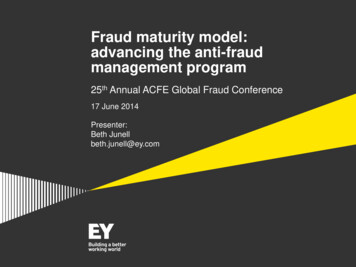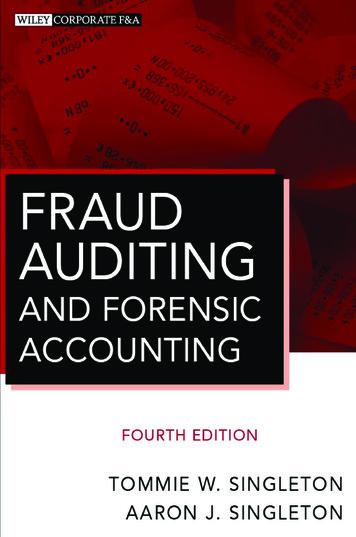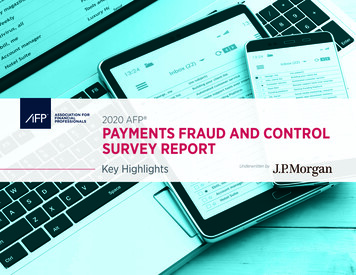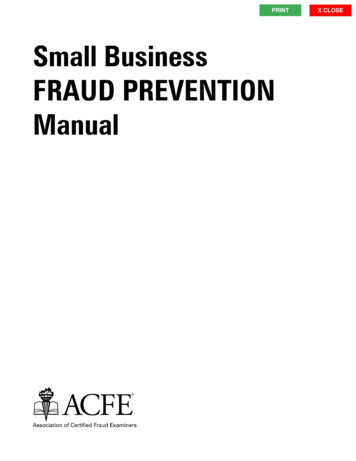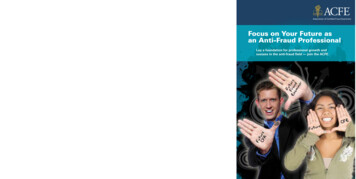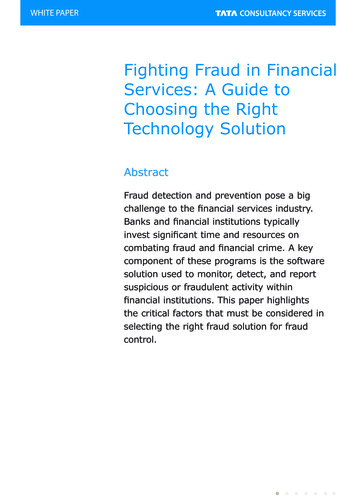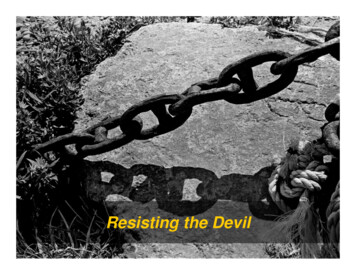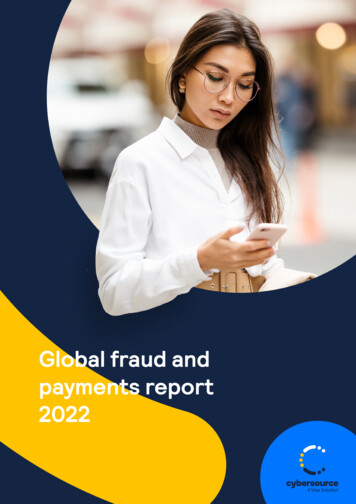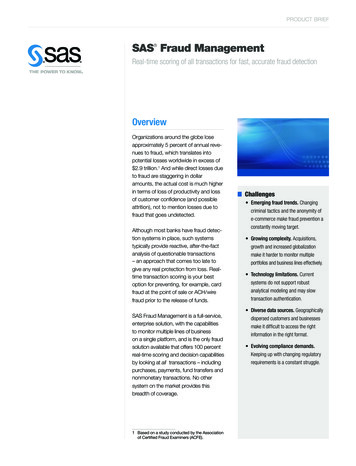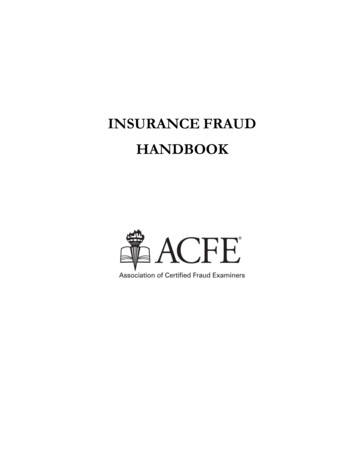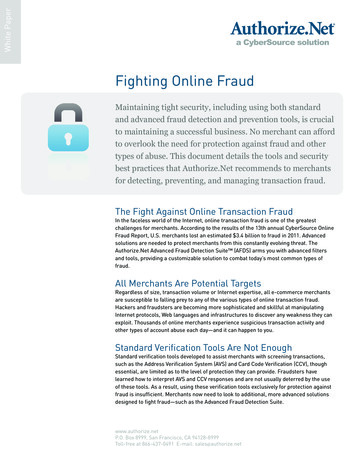
Transcription
Fighting Fraud 101Smart Tips for Investors
Who We AreThe Face of Investment FraudFINRA is a not-for-profit organization dedicated toinvestor protection and market integrity. The FINRAInvestor Education Foundation (FINRA Foundation)supports innovative research and educational projectsthat give underserved Americans the knowledge, skills,and tools to make sound financial decisions throughoutlife. FINRA and the FINRA Foundation do not sellinvestment products, promote products or firms, oroffer specific investment advice.Even if you have never been subjected to an investmentfraudster’s sales pitch, you probably know someonewho has.The FINRA Foundation ’s Investor Protection Campaignis a targeted, research-based effort to reduce theincidence of investment fraud among investors byteaching the tactics most commonly used by fraudstersand the simple steps every investor can take to reducetheir risk. To learn more about the work of the FINRAFoundation, visit FINRAFoundation.org.The U.S. Securities and Exchange Commission’s Office of InvestorEducation and Advocacy has reviewed this publication. The SEC doesnot endorse any particular investment product, service, profession,professional or brokerage firm.2Research has shattered the stereotypes of investmentfraud victims as isolated, frail, and gullible. Do you knowanyone who meets the following description?XSelf-reliant when it comes to making decisionsXOptimisticXAbove-average financial knowledgeXAbove-average incomeXCollege-educatedXOpen to listening to new ideas or sales pitchesIf so, then you know someone who fits the profile ofan investment fraudster’s prime target. The truth is,we’re all at risk. But you can help protect your familyand friends by recognizing how investment fraudstersoperate and by reporting suspicious sales pitches andactual scams.3
The Psychology of a ScamCommon tactics include:We’ve all heard the timeless admonition, “If it soundstoo good to be true, it probably is”— great advice, butthe trick is figuring out when “good” becomes “toogood.” There’s no bright line. Investment fraudstersmake their living by making sure the deals they toutappear both good and true.XThe “Phantom Riches” Tactic – danglingthe prospect of wealth, or of risk-free,guaranteed investments—which, in reality,don’t exist. “These gas wells are guaranteedto produce 6,800 month in income.”XThe “Source Credibility” Tactic – trying tobuild credibility by claiming to be with areputable firm, or to have special credentialsor experience. “Believe me, as a senior vicepresident of XYZ Firm, I would never sell aninvestment that doesn’t produce.”XThe “Social Consensus” Tactic – leading youto believe that other savvy investors havealready invested. “This is how Warren Buffetgot his start. I know it’s a lot of money, butI’m in—and so is my mom and half of herchurch—and it’s worth every dime.”XThe “Reciprocity” Tactic – offering to do asmall favor for you in return for a big favor.“I’ll give you a break on my commission ifyou buy now.”XThe “Scarcity” Tactic – creating a false senseof urgency by claiming limited supply, limitedtime or exclusivity. “There are only two unitsleft, so I’d sign today if I were you. Only a fewselect investors are being brought in on thisdeal.”Fraudsters look for your Achilles’ heel. By askingseemingly benign questions—about your health, family,political views, hobbies or prior employers—they knowwhich buttons to push. Then, they will bombard youwith a flurry of persuasion tactics, which can leave eventhe savviest person in a haze.Fraudsters—who spend their “careers” developingschemes to defraud victims—are continually creatingnew, innovative scams. Knowing the exact scam is notas important as understanding the types of persuasiontactics that are applied across many different schemes.Learning to recognize these tactics can help you avoidbeing a victim.45
Before you invest, ask and check.Ask:üAre you and your firm registered withFINRA? The SEC? A state securitiesregulator?üIs this investment registered with theSEC or my state securities regulator?üHow can I verify this information witha neutral third party?Protect Yourself Check:If these tactics look familiar, it’s because legitimatemarketers use them, too. Here are three key strategiesto help distinguish good offers from bad ones:üVerify the answers by checking the seller’sbackground. Use FINRA’s BrokerCheck,a free online tool that can help youresearch the backgrounds of investmentprofessionals and firms. BrokerCheck cantell you if an individual or firm is registered,provide an overview of an individual’s workhistory and the firm’s history. BrokerCheckalso provides other important informationsuch as regulatory actions, criminalconvictions, and customer complaintsinvolving the investment professionalor firm. Using BrokerCheck is easy, visitbrokercheck.finra.org or call(800) 289-9999.üCheck out the investment and confirmwhat the salesperson tells you using theSEC’s EDGAR database of company filings:Decide now to decide later—Good investments willbe there tomorrow. Don’t be pressured into makingimmediate decisions. Develop a refusal script, thenpractice saying “No.” Say “I never make investingdecisions without first consulting my . I’ll contactyou if I’m still interested.” Fill in the blank withwhomever you choose. Or, simply tell the person “I’mnot interested. Thank you.” Knowing your exit strategyin advance makes it easier to leave the conversation,particularly if the pressure starts increasing.Better yet, refuse to engage from the outset, especiallyif the pitch comes over the Internet or via an unsolicitedtelephone call. Let the call go to voicemail. Do notrespond to or click on links in unsolicited emails fromunknown senders.Turn the tables and ask questions—A legitimateinvestment professional must be properly licensed,and his or her firm must be registered with FINRA, theSecurities and Exchange Commission (SEC), or a statesecurities regulator—depending on the type of businessthe firm conducts.6SEC’s EDGAR Databasewww.sec.gov/edgar.shtmlüContact your state securities regulatorto find out what they know about thecompany:North American Securities AdministratorsAssociationwww.nasaa.org7
Take Your Name OffSolicitation ListsOne easy step you can take toreduce the number of salespitches you receive is to take yourname off of telemarketingand junk mail lists.Talk to someone firstBe extremely skeptical if the person promoting the dealsays, “Don’t tell anyone else about this special deal!”A legitimate investment professional won’t ask you tokeep secrets.Even if the seller and the investment are registered, it’salways a good idea to discuss these sorts of decisionswith family or a trusted financial professional that is notconnected to the offer.See the “Resources” panel at the back of thisbrochure for contact information and a list ofother helpful resources.Are you a senior investor with questions about yourbrokerage account statement or an investment in abrokerage account? FINRA offers a toll-free number thatsenior investors can call to get assistance from FINRAor raise concerns about issues with brokerage accountsand investments. Call the FINRA Securities Helpline forSeniors at 844-57-HELPS (844-574-3577) or learn moreat www.finra.org/seniorhelpline.The answer to “How did they get my name?”is fairly simple: local phone listings, public realestate records, tax assessments on personalproperty, donations to political or charitableorganizations, club rosters, and a host of othersources. Online advertisers use “cookies,” whichare small data files that track information aboutyou. Here’s how to cut the clutter:üTelemarketing Callswww.donotcall.gov(888) 382-1222üDirect Mail and Email Offerswww.dmachoice.orgüCredit Card Offerswww.optoutprescreen.com(888) 567-8688üOnline Cookie Collectingwww.networkadvertising.orgMost legitimate businesses—including securitiesfirms—will honor your request. So, if you receivea solicitation after taking the steps above, youshould be all the more skeptical of the offer.Internet-powered phone systems have made itcheap and easy for scammers to make illegal sales“robocalls” from anywhere in the world. It also letsthem hide from law enforcement by displayingfake caller ID information.Contact your telephone service provider to seeif they offer a call-blocking service or considerpurchasing an app or device to intersect these calls.89
ResourcesIf a Problem OccursBefore you invest, ask and check. Use these helpfulresources for more information about:If you believe you have been defrauded or treatedunfairly—or if you suspect that someone you knowhas been taken in by a scam—be sure to send a writtencomplaint to a securities regulator.A Broker or Firm:FINRA BrokerCheckwww.brokercheck.finra.org(800) 289-9999Here’s where you can turn for help:An Investment Adviser or an Investment:SEC’s Public Disclosure Database and EDGAR Databasewww.investor.gov(800) SEC-0330State-Specific Information on a Broker-Dealer,Investment Adviser, or Investment:North American Securities Administrators Associationwww.nasaa.org(202) 737-0900An Insurance Agent:National Association of Insurance Commissionerswww.naic.org(866) 470-6242A Commodities/Futures/Foreign Exchange Dealer:National Futures Association—BASIC Checkwww.nfa.futures.org/basicnet(800) 621-3570Be a Fraud Fighter and help others learn to spot andavoid fraud. Find helpful tools and information atwww.FINRA.org/Investors.FINRA Complaints and Tips9509 Key West AvenueRockville, MD 20850Fax: (866) tipFINRA Securities Helpline for Seniors Toll-Free: (844) 574-3577Monday – Friday, 9 a.m. – 5 p.m. Eastern Timewww.finra.org/seniorhelplineSEC Office of Investor Education and Advocacy100 F Street, NEWashington, DC 20549-0213Phone: (800) SEC-0330Fax: (202) 772-9295www.sec.gov/complaint.shtmlState Securities RegulatorNorth American SecuritiesAdministrators AssociationPhone: (202) 737-0900www.nasaa.orgFor other scams, contact:AARP Fraud Watch Network HelplinePhone: (877) 908-3360www.aarp.org/money/scams-fraud1011
Connect With UsGet the latest news from the FINRA Foundation and ourinvestor protection network:XSubscribe to our scriptionsXLike FINRA Foundation on Facebook.XFollow @FINRAFoundation on Twitter.www.FINRAFoundation.org 2020 FINRA Foundation. All rights reserved.20 0016.1 – 01/20
FINRA is a not-for-profit organization dedicated to investor protection and market integrity. The FINRA Investor Education Foundation (FINRA Foundation) supports innovative research and educational projects that give underserved Americans the knowledge, skills, and tools to make sound financial decisions throughout life.
